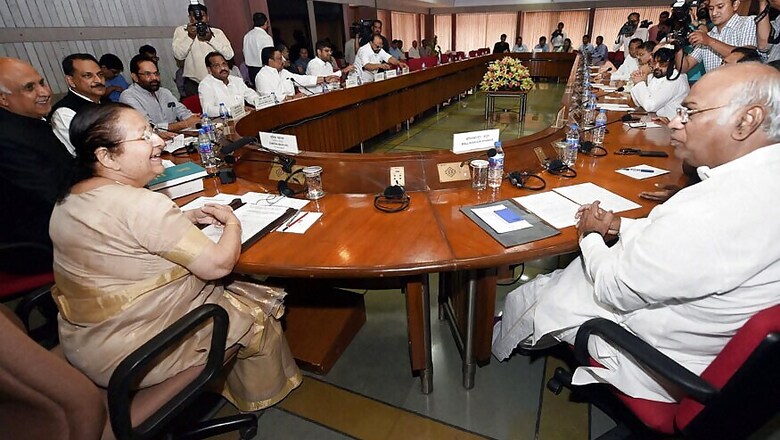
views
New Delhi: Congress on Sunday made it clear at an all-party meeting chaired by Speaker Sumitra Mahajan that it wants a discussion in Lok Sabha on the imposition of President's Rule in Uttarakhand, notwithstanding pleas by the government that the matter is pending before Supreme Court.
After the meeting, Congress leader in Lok Sabha Mallikarjun Kharge said they have put forth their demand for a discussion on the issue and will move an adjournment motion under Rule 56 in Lok Sabha.
The all-party meeting was held in a conducive atmosphere, and the Speaker hoped that the coming session will function smoothly. She said members raised various demands, prominent among which were holding discussions on drought and drinking water shortage in several parts of the country, besides the Uttarakhand issue.
"Drought across the country is a major issue and there was a demand by all for a discussion on it. Some people have also raised the issue of imposition of President's Rule and a discussion on it. We will see as the matter is in court. There are many other issues," she told reporters.
Asked if a discussion on Uttarakhand can be allowed, she said, "The court has given stay till April 27 and I don't think till 27th (there can be a discussion)." "All have extended their support. We all hope that the coming Lok Sabha session will function smoothly," she said. Kharge insisted that the issue was important and many opposition members were in agreement for a discussion.
"We have raised many issues before the Speaker, of which the main one is of Uttarakhand where an attempt has been made to destabilise the Congress government and despite a High Court order, an interim stay has been obtained by the Centre from Supreme Court.
"We have raised the issue and want a discussion on this. A lot of opposition members agree on this and they also want a discussion on this," he told reporters after the meeting.
"We have raised these matters before them. We also requested that there is a rule for everything. But putting (rules) aside, the Speaker can allow anything keeping in view the importance of the subject raised. We have made the request not to cite rules in a bid to suppress issues and deny a discussion," he said.
The second half of the budget session of Parliament, beginning tomorrow, is all set to be a stormy affair with opposition parties closing ranks over the imposition of Presidents' rule in Uttarakhand.
The session will have 15 days of sitting with a total of 90 hours, of which around 52 hours will be devoted to government work. Asked if a discussion on Uttarakhand is possible, Minister of State for Parliamentary Affairs, Rajiv Pratap Rudy said, "The Speaker has to take a decision on it. To my knowledge, the matter is before the court and when the issue is pending in court and a decision is yet to come, there is no scope for a discussion on it."
On today's meeting, he said, "There was complete assurance from all the political parties that the House will be made to run smoothly and the environment looked very good. All have assured and there is a broad consensus that Lok Sabha should function smoothly and all the parties have said this in one voice."
He said the Finance Bill will be taken up during the first week itself. On the GST Bill, which has been pending for a long time, he said, "I am sure the report will come and we are prepared to take it up."
Mukhtar Abbas Naqvi, also a Minister of State for Parliamentary Affairs, said, "We are expecting constructive and positive approach from Congress and the opposition. Our effort is that the House functions smoothly and constructively in a cool atmosphere." On the Uttarakhand issue, he said Congress would have to face its own music as it had dismissed popularly elected governments with majority and when there was no constitutional crisis in the past.
"If the Congress wants to raise the issue, then it would have to face its own history as it was the Congress regimes which has used Article 356 at least 88 times, with former Prime Minister Indira Gandhi using it 50 times during her tenure," he said, adding that Congress mostly used the rule for dismissing governments where there was no lack of majority or a constitutional crisis.




















Comments
0 comment